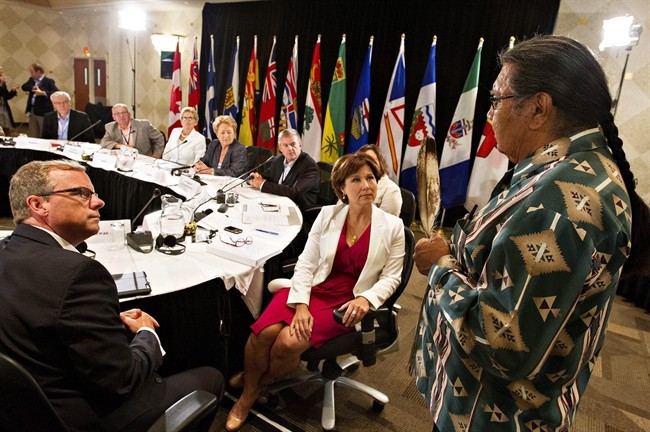NIAGARA-ON-THE-LAKE, Ont. – Provincial and territorial leaders threw their support Wednesday behind a national public inquiry into missing and murdered aboriginal women and girls, ratcheting up the pressure on Prime Minister Stephen Harper to follow suit.

There was support for an inquiry among the premiers who met with aboriginal leaders Wednesday ahead of the Council of the Federation meeting, said Ontario Premier Kathleen Wynne, who will chair the premiers’ summit Thursday.
She said violence against aboriginal women is a very important issue that has touched every Canadian jurisdiction and is extremely important to all the leaders who attended the meeting.
Alberta Premier Alison Redford and Newfoundland Premier Kathy Dunderdale were absent from the meeting, but both later went on record as supporting its outcome.
They did so after Michele Audette, president of the Native Women’s Association of Canada, had said she interpreted their absence as a message of non-support for the inquiry.
But Redford, who had been in Toronto on matters related to Alberta’s flood aftermath, issued a statement saying she in fact supports the decision taken at the meeting.
“I’m very pleased that premiers were able to take this important step forward together today,” the statement said.
And a spokeswoman for Dunderdale said in a statement the Newfoundland and Labrador premier was supportive of the outcome of the day’s meeting and had been unable to attend due to a family emergency.
“Newfoundland and Labrador has been on the record as saying we support the Native Women’s Association of Canada themselves calling for a Public inquiry into missing and murdered Aboriginal Women and Children,” said the statement.
First Nations’ calls for a public inquiry on violence against aboriginal women have garnered support across the country in recent years.
Aboriginal leaders praised the attending premiers for supporting the cause, hailed as a major step in their crusade for an inquiry, which has been endorsed by Amnesty International Canada.
“This is an important expression of support,” said Shawn Atleo, National Chief of the Assembly of First Nations.
The Native Women’s Association of Canada has been saying for 13 years that there’s a rise in missing aboriginal women, Audette said. The organization has documented about 582 cases of missing or murdered women and girls.
Audette said she’ll phone the federal government Thursday and push for a letter from the premiers to be sent to Harper and Aboriginal Affairs Minister Bernard Valcourt. She’ll also be reaching out to the two missing premiers to see if they’ll support an inquiry.
“We did a major, major step today – or a major moccasin step, I always say,” she said.
Violence against aboriginal women is a “huge” issue in Manitoba, which has a lot of missing people, said Premier Greg Selinger.
“It speaks to the most vulnerable people in our community and when they go missing, we are all worse off,” he said.
“And we want to make sure they’re safe and our streets are safe and our neighbourhoods are safe and young women are safe regardless of who they are.”
It’s a big problem in the North too, particularly in small, isolated communities where women can’t get help, said Northwest Territories Premier Bob MacLeod.
“I think this gives a statement that this is a serious problem and that all of the premiers want to see something done,” he said.
Others issues discussed at the premiers’ meeting with aboriginal groups included improvements in education for aboriginal students on and off reserve.
Funding for students on reserve is up to $3,500 less per pupil than students off reserve, Wynne said.
But Wynne and Atleo say they’re not looking for Ottawa to hand over the responsibility to the provinces. They’d rather see the federal government work with the provinces and aboriginal communities to help aboriginal students succeed, said Wynne.
“The kinds of solutions that are working in P.E.I., that are working in British Columbia, that are going to work in Quebec and Ontario may be slightly different,” she said.
“But what we need is the federal government at the table as a full partner in terms of funding their responsibilities and at the same time, recognizing that provincial governments bring huge expertise in education.”

Comments